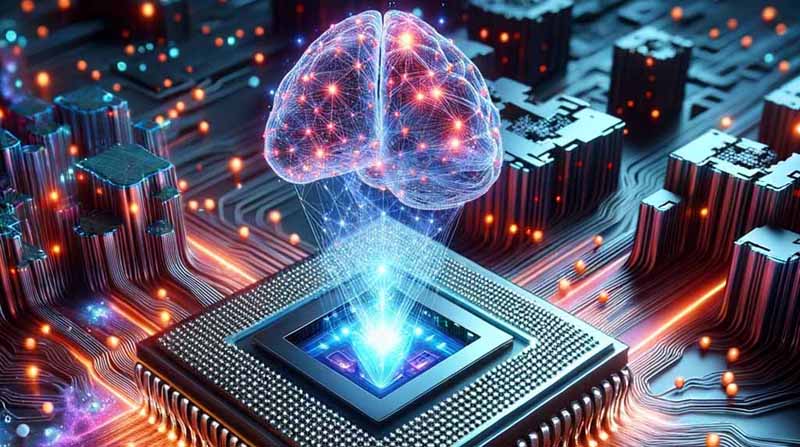The fusion of artificial intelligence and quantum computing promises a transformative leap in technological capabilities, reshaping the boundaries of what machines can achieve. As AI continues its ascent, becoming a cornerstone in myriad sectors, the introduction of quantum principles offers a pathway to transcend current limitations. This article delves into the intricate interplay between these two domains, evaluating the potential outcomes, safety implications, and the tantalizing prospect of achieving Artificial General Intelligence (AGI) that surpasses human cognitive abilities.
Contents
- Introduction to Quantum Computing and AI
- Speed and Efficiency Gains with Quantum Processors
- Potential Outcomes of Quantum-Driven AI
- Safety Concerns in the Quantum AI Landscape
- The Road to AGI – Implications of Quantum Enhancement
- Comparing Classical AI and Quantum AI Limitations
- Strategies for Ethical Deployment of Quantum AI
Introduction to Quantum Computing and AI

Artificial intelligence, having transformed industries and daily lives alike, has predominantly been powered by classical computing, which, though advanced, operates on a binary system of bits, ones and zeros, that dictate its processing capabilities. Quantum computing, on the other hand, introduces the novel concept of qubits, which can exist in multiple states simultaneously, giving rise to a paradigm shift in computing power and potential. As the convergence of these two groundbreaking technologies begins to take shape, researchers and enthusiasts anticipate an era where AI not only performs tasks with unprecedented efficiency but also grasps complex problems in ways previously deemed unattainable by classical computational means. This section aims to lay the foundation, shedding light on the core principles of quantum computing and its symbiotic relationship with the continuously evolving field of artificial intelligence.
Speed and Efficiency Gains with Quantum Processors

The computational landscape, historically dominated by classical silicon-based processors, has reached unprecedented heights in speed and efficiency, but not without nearing its theoretical limits, prompting the search for alternative avenues of technological advancement. Quantum processors, leveraging the principles of superposition and entanglement inherent in quantum mechanics, offer the tantalizing potential to process vast amounts of data in parallel, dwarfing the capabilities of even the most advanced classical counterparts. This quantum advantage, as it’s often termed, not only elevates the speed at which computations are executed but also the range of problems that can be tackled, from complex simulations to intricate optimization challenges, presenting a transformative shift in the way we approach computational tasks and problem-solving in the digital age.
Potential Outcomes of Quantum-Driven AI

Quantum-driven AI, a synthesis of quantum computing principles with artificial intelligence algorithms, beckons a future teeming with immense possibilities, where the confluence of these technologies augments computational prowess to previously unimaginable scales. As quantum processors can evaluate multiple solutions concurrently due to their inherent property of superposition, AI models trained on such systems could potentially decipher patterns, anomalies, and insights from vast datasets at speeds that would make current supercomputers appear pedestrian. Beyond mere speed enhancements, the union of quantum computing and AI promises breakthroughs in sectors ranging from healthcare, where drug discovery could be revolutionized, to finance, where risk assessment models could predict market fluctuations with uncanny accuracy, to even environmental sciences, where climate change models could achieve hitherto unparalleled precision in forecasting and mitigation strategies.
Safety Concerns in the Quantum AI Landscape

As with any technological advancement, the fusion of quantum computing and artificial intelligence, while promising unparalleled benefits, brings forth a slew of safety concerns that researchers, policymakers, and industry leaders must address proactively. The sheer computational might of quantum-driven AI, if left unchecked or in the wrong hands, poses risks of misuse, from breaking cryptographic codes safeguarding sensitive data to enabling malicious actors to harness this power for nefarious purposes. Furthermore, the unpredictability of quantum systems, combined with the autonomous decision-making capabilities of AI, could lead to unintended outcomes or system behaviors that deviate from human-defined objectives, necessitating rigorous testing, validation, and the establishment of ethical guidelines to ensure the responsible deployment and use of this groundbreaking technology.
The Road to AGI – Implications of Quantum Enhancement

Artificial General Intelligence (AGI), the pinnacle of AI research, represents a form of intelligence that exhibits human-like cognitive abilities across diverse domains, rather than excelling in a singular, specialized task. The integration of quantum computing into AI research offers profound implications for this journey to AGI, as the multidimensional computational space of quantum systems provides an environment conducive for training more robust, versatile, and adaptive AI models. The potential of quantum-enhanced neural networks, able to process and store information in ways that classical systems cannot, might pave the way for AI systems that understand, learn, and reason in a manner more aligned with human cognition, but with the added benefit of computational speeds and efficiencies that are orders of magnitude greater. As we edge closer to this horizon, it becomes imperative to weigh the benefits against the challenges, ensuring that our pursuit of AGI remains grounded in ethical considerations and societal well-being.
Comparing Classical AI and Quantum AI Limitations

Classical AI, built upon traditional computing architectures, has made remarkable strides in various domains, from natural language processing to image recognition, yet it grapples with certain intrinsic limitations, notably in terms of computational speed, energy efficiency, and the handling of exceptionally large datasets. Quantum AI, while still in its nascent stages, promises to address some of these shortcomings, benefiting from the unique properties of qubits, such as superposition and entanglement, which allow for parallel processing of information. Nonetheless, quantum AI is not without its own set of challenges, including issues related to quantum decoherence, error rates, and the current infancy of quantum hardware. As we juxtapose these two paradigms, it becomes evident that while quantum AI holds significant potential to overcome classical AI’s limitations, it introduces a new set of complexities that researchers must navigate to harness its full potential.
Strategies for Ethical Deployment of Quantum AI

The integration of quantum computing with artificial intelligence heralds an era of enhanced capabilities, but with it comes the pressing need to ensure ethical deployment. Quantum-enhanced AI systems, with their potential to solve complex problems at unprecedented speeds, demand a reevaluation of existing ethical frameworks to account for new challenges and possibilities. First and foremost, transparency in the development and application of these technologies becomes paramount, ensuring that stakeholders understand the decision-making processes and potential biases inherent in quantum AI models. Furthermore, as with all powerful tools, there exists the potential for misuse, necessitating robust governance structures and guidelines that strike a balance between innovation and societal welfare. As the quantum AI frontier continues to expand, proactive engagement with ethical considerations will be crucial in guiding its responsible and beneficial evolution in the years to come.

